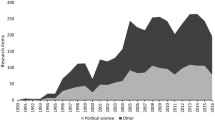Abstract
We offer a theory to identify the determinants of presidential campaign rhetoric related to the federal budget. The theory builds on the literature dealing with issue ownership, candidate strategy, retrospective voting, and voter preferences to generate eight hypotheses about the use of budget rhetoric. To test these hypotheses, over 800 campaign speeches from the major party presidential nominees from 1952 to 2000 are content analyzed. The content analysis generates measures of both the volume and tone of budget rhetoric. Volume is driven primarily by the objective balance of the budget and subjective importance given to it by voters and a conditional effect involving budget balance, incumbency, and partisanship. Tone is more complex, with “positive” rhetoric determined mostly by the budget balance and partisanship and “overstated” rhetoric shaped solely by the salience of the budget to the electorate. The article concludes with suggestions for future research.
Similar content being viewed by others
REFERENCES
Alesina, Alberto, Roubini, Nouriel, and Cohen, Gerald D. (1997). Political Cycles and the Macroeconomy. Cambridge, MA: The MIT Press.
Budge, Ian, and Farlie, Dennis J. (1977). Voting and Party Competition. New York: John Wiley & Sons.
Budge, Ian, and Farlie, Dennis J. (1983). Party competition—selective emphasis or direct confrontation? An alternative view with data.” In Hans Daadler and Peter Mair (eds.), Western European Party Systems, pp. 267–306. Beverly Hills, CA: Sage.
Cohen, Jeffrey E. (1995). Presidential rhetoric and the public agenda. American Journal of Political Science 39: 87–107.
Cohen, Jeffrey E. (1997). Presidential Responsiveness and Public Policy-Making: The Public and the Policies that Presidents Choose. Ann Arbor: University of Michigan Press.
Coleman, John J. (1996). Party Decline in America. Princeton, NJ: Princeton University Press.
Dover, E. D. (1994). Presidential Elections in the Television Age. Westport, CT: Praeger Publishers.
Downs, Anthony (1957). An Economic Theory of Democracy. New York: Harper Collins Publishers.
Fiorina, Morris (1981). Retrospective Voting in American National Elections. New Haven, CT: Yale University Press.
Hansen, John Mark (1998). Individuals, institutions, and public preferences over public finance. American Political Science Review 92: 513–531.
Hart, Roderick P. (2000). Campaign Talk: Why Elections Are Good for Us. Princeton, NJ: Princeton University Press.
Hill, Kim Quaile (1998). The policy agendas of the president and the mass public: a research validation and extension. American Journal of Political Science 42: 1328–1234.
Hinckley, Barbara (1990). The Symbolic Presidency: How Presidents Portray Themselves. New York: Routledge.
Hinich, Melvin J., and Munger, Michael C. (1994). Ideology and the Theory of Political Choice. Ann Arbor, MI: The University of Michigan Press.
Holbrook, Thomas M. (1996). Do Campaigns Matter? Thousand Oaks, CA: Sage Publications.
Jacobs, Lawrence R., and Shapiro, Robert Y. (2000). Politicians Don't Pander. Chicago: University of Chicago Press.
Jacobson, Gary C. (1990). The Electoral Origins of Divided Government. Boulder, CO: Westview Press.
Jacobson, Gary C., and Dimock, Michael A. (1994). Checking out: the effects of bank overdrafts on the 1992 House elections. American Journal of Political Science 38: 601–624.
Kelly, Edward F., and Stone, Philip J. (1975). Computer Recognition of English Words Senses. Amsterdam: North-Holland Publishing.
Kettl, Donald F. (1992). Deficit Politics. New York: Macmillan.
Kiewiet, D. Roderick (1983). Macroeconomics and Micropolitics. Chicago: University of Chicago Press.
Kinder, Donald, Peters, Mark D., Abelson, Robert P., and Fiske, Susan T. (1980). Presidential prototypes. Political Behavior 2: 315–337.
Lipset, Seymour M., and Rokkan, Stein (1967). Party Systems and Voter Alignments. New York: The Free Press.
Miller, Warren E., and Shanks, J. Merrill (1996). The New American Voter. Cambridge, MA: Harvard University Press.
Modigliani, Andre, and Modigliani, Franco (1987). The growth of the federal deficit and the role of public attitudes. Public Opinion Quarterly 51: 459–480.
Neustadt, Richard E. (1990). Presidential Power: The Politics of Leadership from FDR to Reagan. New York: Wiley.
Page, Benjamin I. (1978). Choices and Echoes in Presidential Elections: Rational Man in Electoral Democracy. Chicago: University of Chicago Press.
Page, Benjamin I., and Shapiro, Robert Y. (1992). The Rational Public. Chicago: University of Chicago Press.
Petrocik, John R. (1996). Issue ownership in presidential elections, with a 1980 case study. American Journal of Political Science 40: 825–850.
Popkin, Samuel L. (1994). The Reasoning Voter: Communication and Persuasion in Presidential Campaigns, 2nd ed. Chicago: University of Chicago Press.
Rahn, Wendy M., Aldrich, John H., Borgida, Eugene, and Sullivan, John L. (1990). A social cognitive model of candidate appraisal. In John A. Ferejohn and James H. Kuklinski (eds.), Information and Democratic Processes, pp. 136–159. Urbana: University of Illinois Press.
Rosenstone, Steven J., Behr, Roy L., and Lazarus, Edward H. (1996). Third Parties in America: Citizen Response to Major Party Failure, 2nd ed. Princeton, NJ: Princeton University Press.
Savage, James D. (1988). Balanced Budgets and American Politics. Ithaca, NY: Cornell University Press.
Shuman, Howard E. (1984). Politics and the Budget. Upper Saddle River, NJ: Prentice Hall.
Stone, Philip J., Dunphy, Dexter C., Smith, Marshall S., Ogilvie, Daniel M., and associates (1966). The General Inquirer: A Computer Approach to Content Analysis. Cambridge, MA: MIT Press.
Tufte, Edward R. (1978). Political Control of the Economy. Princeton, NJ: Princeton University Press.
Wildavsky, Aaron, and Caiden, Naomi (1997). The New Politics of the Budgetary Process. Boston: Addison-Wesley.
Author information
Authors and Affiliations
Rights and permissions
About this article
Cite this article
Burden, B.C., Sanberg, J.N.R. Budget Rhetoric in Presidential Campaigns from 1952 to 2000. Political Behavior 25, 97–118 (2003). https://doi.org/10.1023/A:1023825212333
Issue Date:
DOI: https://doi.org/10.1023/A:1023825212333




